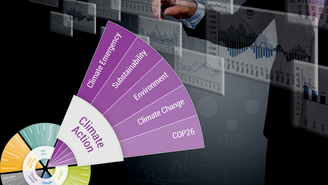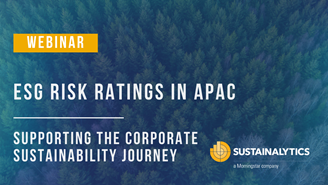ESG Implications of Russia’s Invasion of Ukraine on the Aviation and Defense Sectors
The aviation industry is feeling the impact of rising fuel costs as an immediate repercussion of the conflict in Ukraine. In particular, the airline sector is still facing significant challenges in mounting a steady recovery from the COVID-19 crisis. On the other hand, the defense industry may be presented with opportunities in light of increased government spending in the aftermath of the invasion.
Banks’ ESG Risks Related to the Russia-Ukraine Conflict on Investors’ Radars
Investor interest in the banking sector remains high as the impact of Russian sanctions unfolds. Based on Morningstar Sustainalytics’ research, total unmanaged risk has increased for both Russian and international banks with exposure to Russian clients. To what extent have sanctions affected banks’ total unmanaged risk?
Leveraging Blockchain to Improve Supply Chain Management - A Case Study for Household and Personal Products Companies
With growing scrutiny from stakeholders—international regulators and regional governments, NGOs, the general public, investors, and financial institutions—companies accused of human rights violations and environmental damage in their supply chains face substantial risks.
ESG Benchmarking: Helping Asia Pacific companies excel their sustainability performance
Hear from a panel of ESG thought leaders, sharing their insights on how Sustainalytics ESG Benchmarking Solutions supported them understanding its ESG position among industry peers, identifying gaps and communicating sustainability accomplishments to key stakeholders.
Biodiversity loss and climate change call for a nature-positive economy – Stewardship may lead the way
Financial institutions funding the supply chains affected by biodiversity loss stand to lose right alongside farmers, producers and retailers—and so, in turn, do investors. ESG stewardship continues to be a powerful investor instrument to mitigate risks on a changing planet. With growing expectations of double materiality, it is an opportunity for investors to have a greater societal impact and support the transition towards a nature-positive economy.
Mass Timber in Construction - Big Buildings, Smaller Carbon Footprint
As an innovation in the industry, mass timber construction emits significantly less carbon than traditional concrete and metal structures, while modular construction ensures usability across many building types. This article reviews some of the concerns over structural strength, fire safety, regulatory compatibility, cost savings and the sustainability of increased forestry. It then examines current mass timber buildings and projects and looks at their viability as an alternative material for the future.
Russia, ESG Risks in Energy, and Corporate Citizenship
As the unprecedented situation in Ukraine continues to unfold, Russia’s energy industry has remained remarkably untouched by the waves of sanctions currently being deployed against the country, despite being arguably its most important sector. While the European Union and its allies have been cautious to avoid disrupting energy flows (unlike how sanctions are currently disrupting the flow of capital), international oil companies are responding to the crisis in their own capacity.
Key Themes Shaping Proxy Voting in 2022
As the volume and breadth of ESG risk exposure continue to rise, the stage is set for another momentous proxy season. The trending topics of last year will continue to steer the agenda—with the prospect of even more substantial support from shareholders in 2022.
The Sustainability Conundrum of Living Income in Agriculture
Living Income is a crucial consideration among leading companies across some sectors and their supplier companies throughout the agricultural and food supply chain. Companies that manage ESG risk in their supply chains, making targeted investments to improve their resilience, are better positioned to build investor confidence.
EU Taxonomy in Limbo - Reporting Alignment of Article 8 and 9 Funds in 2022
For observers of the EU’s Sustainable Finance Strategy, 2022 kicked off with a crack and a bang as the European Commission went ahead with plans to include natural gas and nuclear-related activities as potentially sustainable under their ‘Green Taxonomy’. However, in midst of this furor, seemingly less attention has been paid to other components of the regulation that have quietly taken effect from the 1st of January 2022, presenting their own set of challenges.
The ESG Risks of National Oil Companies Taking Over Fossil Fuel Production from International Oil Majors
As growing pressure to cut GHG emissions is causing Western oil majors to sell their high-carbon assets, it is expected that National Oil Companies (NOCs) will pick up some of the production. For investors holding an interest in or considering investing in NOCs or sovereign debt, it is worth assessing how fossil fuel production shifts will impact their portfolio’s alignment with climate ambitions and ESG values.
What Happens When Companies are Receptive to Investor Feedback on ESG?
When companies are receptive to investor feedback, there are clear real-world impacts and positive changes. Such engagement outcomes vary and are directly tied to the company and its company-specific exposure to material ESG issues.
3 Reasons to Skill Up and Scale Up ESG Stewardship in 2022
As our clients and the industry at large focus on proactively mitigating risk and capitalizing on this evolving landscape, stewardship will be a key lever for savvy investors—particularly those facing external pressure to divest. Here are the ESG themes we see influencing stewardship priorities this year.
For Investors with Ambitions to Lead on Climate Action Post COP26
In the weeks following COP26, investors in the UK and worldwide face a myriad of upcoming climate-related regulations heading towards the implementation phase. In addition, major global coalitions such as the Glasgow Financial Alliance for Net Zero have sprung up to attempt to accelerate decarbonization via targeted investment.
Exploring the Role of ESG Factors in the Fixed Income Investing Process
While many mainstream investors with an equity focus are applying ESG considerations as a part of their investment decision-making processes, how are fixed-income investors looking at ESG factors to assess corporate credit risk, bond selection, and other related activities?
Momentum Around Principal Adverse Impact Data Remains Strong Despite SFDR Delays
Despite the shifting timelines, we observe that the market momentum around PAIs is not diminishing, quite the contrary. Investors in the scope of the regulation are using the fourth quarter of this year to get acquainted with PAI data and set up their systems. Most investors we speak with want to be prepared in time to be able to monitor PAIs throughout 2022 and adjust their portfolios to boost their PAIs (or rather limit the downside, as these are adverse impact indicators). This means that PAIs may significantly impact stock selection and portfolio construction by fund managers keen to have ‘good’ PAI scores.
Biodiversity: A Crisis Equaling, Possibly Exceeding, Climate Change
According to the UN’s Convention on Biological Diversity the main drivers of biodiversity loss are habitat loss and degradation, climate change, pollution, over-exploitation, and invasive species. Habitat loss is directly linked to the conversion of natural ecosystems to agricultural lands and unsustainable use of water resources.
Bringing Investors and Companies Together to Accelerate Human Rights Progress
Human rights issues have been rising on the responsible investment agenda in recent years. The COVID-19 pandemic and the Black Lives Matter movement have provoked even more pointed discourse on the topic. The European Union’s current efforts to introduce rules to hold companies accountable for social and environmental risks in their supply chains further accelerate that ascent. This wave of legal requirements and normative expectations is impacting financial markets worldwide, with responsible business regulations already in place or quickly becoming valid.





-(1200-x-600-px)-(5).tmb-thumbnl_rc.png?Culture=en&sfvrsn=e57ab91e_4)














